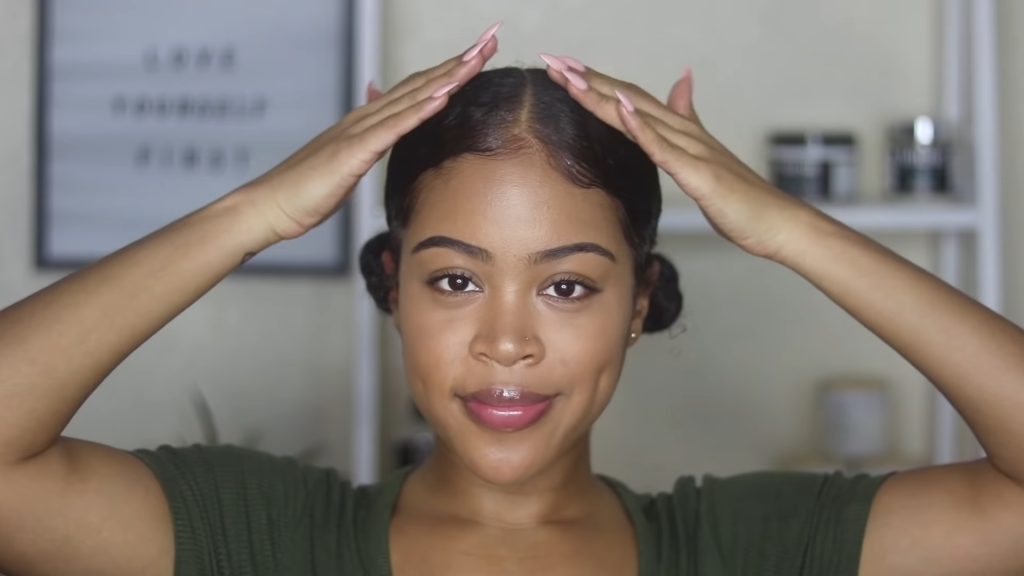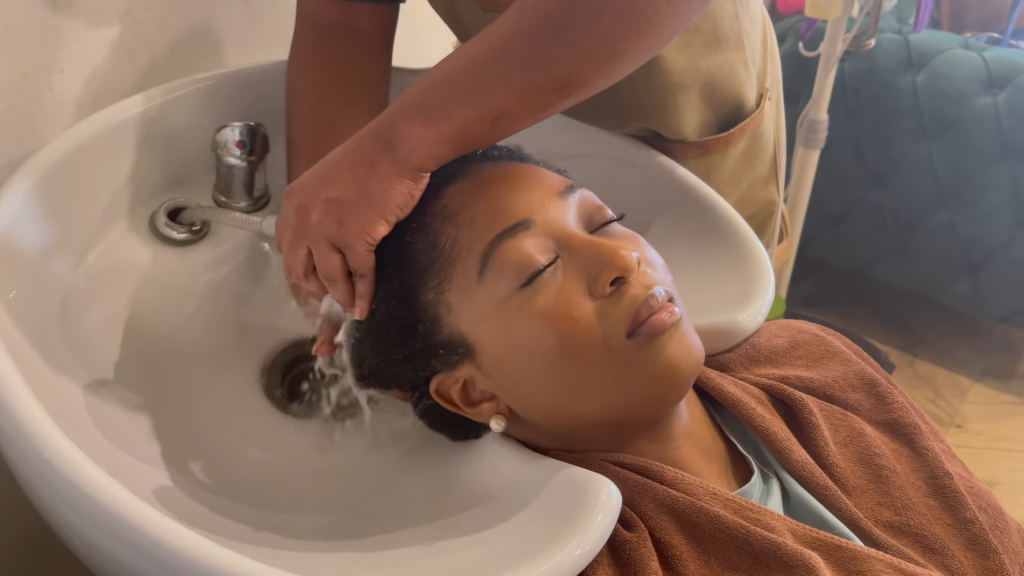Discover the top baby shampoo options specifically formulated for African hair.
The Best Baby Shampoo for African Hair
African hair has unique characteristics that require special care and attention. Choosing the right baby shampoo for African hair is crucial to maintaining its health and beauty. In this article, we will provide an overview of African hair and the importance of using the right shampoo. We will also review the top baby shampoos for African hair and discuss the key ingredients to look for. Additionally, we will provide a step-by-step guide on how to properly shampoo African baby hair, and highlight common mistakes to avoid. By the end of this article, you will have all the information you need to select the best baby shampoo for your little one’s African hair.

Understanding African Hair: An Overview
African hair is known for its unique texture and structure. It tends to be coarse, thick, and tightly coiled, which can make it prone to dryness and breakage. The natural curl pattern of African hair also requires special care to prevent tangling and knotting. Understanding the characteristics of African hair is essential in choosing the right shampoo that will meet its specific needs.
The Unique Characteristics of African Hair
One of the main characteristics of African hair is its high porosity. This means that the hair strands have gaps in the cuticle layer, which allows moisture to easily escape. As a result, African hair tends to become dry and brittle if not properly moisturized. Additionally, the high porosity of African hair can also make it more susceptible to damage from heat styling tools and chemical treatments.
Another characteristic of African hair is its density. African hair typically has more hair follicles per square inch compared to other hair types. This density can make African hair appear fuller and thicker, but it also means that it requires extra care when detangling and styling. The tight curl pattern can lead to the formation of knots and tangles, making it important to use products that provide excellent detangling properties.
Furthermore, African hair often has a wide range of textures and curl patterns. From tight coils to looser curls, each individual’s hair may have its own unique combination. This diversity makes African hair versatile and allows for a variety of styling options, but it also means that a one-size-fits-all approach to hair care may not be effective.
Why Special Care is Needed for African Hair
African hair requires special care because of its unique characteristics. Its high porosity makes it more susceptible to moisture loss, which can lead to dryness, breakage, and a lack of shine. The tight curl pattern can also make it challenging to detangle and style. Using the wrong shampoo can exacerbate these issues and cause further damage to the hair. That is why it is crucial to choose a baby shampoo specifically formulated for African hair.
In addition to choosing the right shampoo, other aspects of hair care are also important for maintaining the health and vitality of African hair. Regular deep conditioning treatments can help replenish moisture and strengthen the hair strands. Protective styling, such as braids or twists, can help minimize breakage and tangling. It is also essential to avoid excessive heat styling and harsh chemical treatments, as these can further damage the hair.
Moreover, understanding the cultural significance of African hair is crucial in appreciating its beauty and embracing its natural state. African hair has long been a symbol of identity and pride within the African diaspora. Celebrating and embracing the natural texture and versatility of African hair can help promote self-acceptance and challenge societal beauty standards.
In conclusion, African hair is a unique and diverse hair type that requires special care and attention. Its high porosity, density, and tight curl pattern necessitate the use of products specifically formulated for African hair. Understanding the characteristics and cultural significance of African hair is essential in promoting healthy hair care practices and embracing natural beauty.
Importance of Choosing the Right Baby Shampoo
The role of shampoo in maintaining hair health cannot be underestimated. A good baby shampoo cleanses the hair and scalp, removes dirt, oil, and product buildup, and helps to balance the natural moisture levels of the hair. When it comes to African hair, choosing the right shampoo is even more critical. The right shampoo can provide deep hydration, promote hair strength, and help to prevent breakage and damage.
When selecting a baby shampoo for African hair, it is important to consider the unique characteristics of this hair type. African hair is naturally more prone to dryness due to its tightly coiled structure. The coils make it difficult for the natural oils produced by the scalp to travel down the hair shaft, resulting in dry and brittle hair. Therefore, a shampoo that provides intense moisture and nourishment is essential to combat dryness and keep the hair hydrated and strong.
Shampooing is an essential part of a healthy hair care routine. It helps to remove dirt, sweat, excess oil, and environmental pollutants from the hair and scalp. Regular shampooing also promotes a clean and healthy scalp, which is crucial for hair growth. For African hair, a shampoo that provides moisture and nourishment is essential to combat dryness and keep the hair hydrated and strong.
In addition to cleansing, a good baby shampoo for African hair should also promote hair strength and prevent breakage. The tight coils of African hair make it more prone to breakage, especially when it lacks moisture. A shampoo that contains ingredients such as keratin or biotin can help strengthen the hair shaft and reduce breakage, resulting in healthier and longer hair.
Using the wrong shampoo on African hair can have detrimental effects. Shampoos that contain harsh chemicals, sulfates, and drying alcohols can strip the hair of its natural oils and moisture, leading to dryness, breakage, and frizz. They can also cause scalp irritation and inflammation. It is crucial to choose a baby shampoo that is free from harmful ingredients and specifically formulated to meet the unique needs of African hair.
When shopping for a baby shampoo for African hair, look for products that are labeled as moisturizing, hydrating, or specifically formulated for dry and curly hair. These shampoos are typically enriched with natural oils, such as coconut oil or shea butter, which provide deep hydration and nourishment to the hair and scalp. Avoid shampoos that contain sulfates, as they can be drying and damaging to African hair.
Remember, choosing the right baby shampoo for African hair is not only about cleansing but also about nourishing and protecting the hair. By selecting a shampoo that is specifically designed for African hair, you can ensure that your baby’s hair remains healthy, strong, and beautiful.
Top Baby Shampoos for African Hair
When it comes to selecting a baby shampoo for African hair, there are several excellent options available. We have reviewed some of the top baby shampoos that are specifically formulated for African hair. Let’s take a closer look at each shampoo and their pros and cons.
Detailed Reviews of Each Shampoo
1. AfroBaby Naturals Baby Shampoo: This shampoo is specially formulated for African baby hair. It contains natural ingredients like shea butter and coconut oil, which provide deep hydration and nourishment. The gentle formula cleanses the hair without stripping it of its natural oils. It also helps to detangle and reduce breakage. However, some users find the scent overpowering.
2. Mizani True Textures Baby Wash & Shampoo: This shampoo is designed for curly and coily hair types, including African hair. It has a rich lather that removes impurities and buildup. It also contains moisturizing ingredients like coconut oil and shea butter to hydrate and soften the hair. However, it is a bit pricey compared to other options.
3. Mixed Chicks Kids Shampoo: This shampoo is formulated to cleanse and moisturize curly hair, including African hair. It contains natural ingredients like jojoba oil and aloe vera, which help to nourish and detangle the hair. It is also gentle enough for daily use. However, some users find it too watery in consistency.
Pros and Cons of Each Shampoo
1. AfroBaby Naturals Baby Shampoo:
Pros: Deep hydration, reduces breakage
Cons: Strong scent
2. Mizani True Textures Baby Wash & Shampoo:
Pros: Removes impurities, moisturizing
Cons: Higher price
3. Mixed Chicks Kids Shampoo:
Pros: Nourishing, suitable for daily use
Cons: Thin consistency
Ingredients to Look for in Baby Shampoo for African Hair
When choosing a baby shampoo for African hair, it is important to look for specific ingredients that provide deep hydration and nourishment. Natural ingredients like essential oils and plant extracts are beneficial for African hair. Let’s explore some key ingredients to look for:
Essential Oils and Their Benefits
Essential oils, such as coconut oil, jojoba oil, and shea butter, are excellent moisturizers for African hair. They penetrate the hair shaft, providing deep hydration and sealing in moisture. These oils also have nourishing properties that help to strengthen the hair and reduce breakage. Additionally, they can provide a pleasant aroma to the shampoo.
Natural Ingredients vs. Chemicals
When it comes to baby shampoos for African hair, it is best to opt for products that are made with natural ingredients rather than harsh chemicals. Natural ingredients are gentle on the hair and scalp, minimizing the risk of irritation and dryness. They also provide nourishment and hydration without stripping the hair of its natural oils. Avoid shampoos that contain sulfates, parabens, and artificial fragrances.
How to Properly Shampoo African Baby Hair
Shampooing African baby hair requires a gentle and meticulous approach to prevent damage and maintain its health. Here is a step-by-step guide to shampooing African baby hair:

Step-by-Step Guide to Shampooing
- Wet the hair with warm water. This helps to open the cuticle and allows the shampoo to penetrate deeply.
- Apply a small amount of baby shampoo to the hair and gently massage the scalp with your fingertips. Focus on the roots and scalp, as these areas tend to accumulate the most dirt and oil.
- Rinse the hair thoroughly with warm water. Make sure to remove all traces of shampoo to avoid any residue that can cause dryness or irritation.
- Apply a conditioner or leave-in conditioner to moisturize and detangle the hair. Leave it on for a few minutes, then rinse thoroughly.
- Gently towel dry the hair by patting it with a soft towel. Avoid rubbing vigorously, as this can cause frizz and breakage.
- Style the hair as desired. Avoid using heat styling tools frequently, as they can damage the hair.
Common Mistakes to Avoid
- Using hot water: Hot water can strip the hair of its natural oils and cause dryness. Stick to warm or cool water for shampooing.
- Overwashing: Shampooing too frequently can lead to dryness and strip the hair of its natural oils. Aim to shampoo African baby hair once or twice a week.
- Skipping conditioner: Conditioning is essential for moisturizing and detangling African hair. Don’t skip this crucial step in the hair care routine.
- Using the wrong shampoo: Using a shampoo that is not specifically formulated for African hair can cause dryness, breakage, and other issues. Make sure to choose a shampoo that meets the needs of African hair.
By following these tips and choosing the right baby shampoo for African hair, you can keep your little one’s hair healthy, moisturized, and beautiful. Remember, proper hair care is essential for promoting growth and maintaining the natural beauty of African hair.






[…] Coily hair, also known as Type 4 hair, is characterized by tightly coiled or curled strands. This hair type is common among individuals of African descent, but can also be found in other ethnicities. Coily hair has its own set of challenges, […]